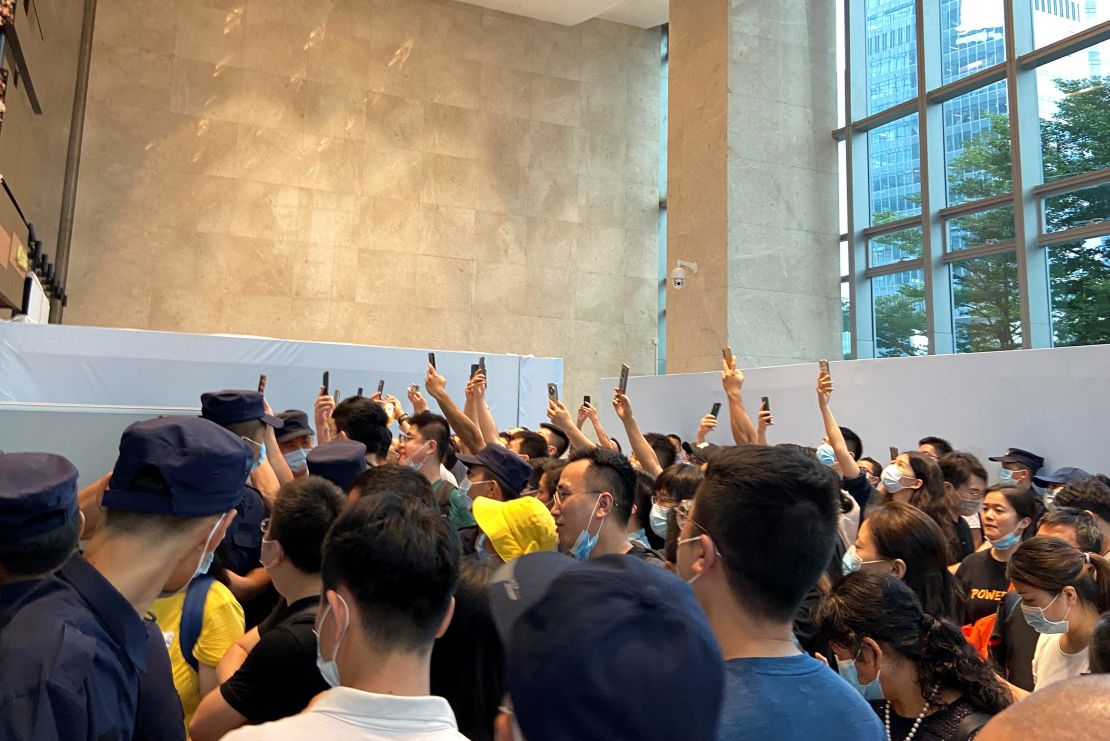Evergrande is once again warning that it could default on its huge debts as it struggles to cut costs or find anyone to buy some of its assets.
The embattled Chinese property giant has already warned in recent weeks of its cash crisis, listing $300 billion in total liabilities and saying that it could default if it’s unable to raise money quickly.
Should that happen, the effects would be felt across China’s banking system and the wider economy. The group has already suspended work on some projects as it tries to conserve cash, a move that’s poised to hit China’s property sector.
Markets in the region shook on Tuesday. The Shanghai Composite (SHCOMP) closed down 1.4%, while Hong Kong’s Hang Seng index (HSI) fell 1.2%.
Evergrande disclosed on Tuesday that it had made “no material progress” in its search for investors to buy part of its stakes in its electric vehicle and property services businesses.
“If the group is unable to meet its guarantee obligation or to repay any debt when due or agree with the relevant creditors on extensions of such debts or alternative agreements, it may lead to cross-default,” it said.
The company also announced in a stock exchange filing in Hong Kong that it had enlisted financial advisers to “evaluate the liquidity of the group and explore all feasible solutions” as quickly as possible. But the company cautioned that nothing was guaranteed.
The disclosure came hours after Evergrande, which is one of China’s largest real estate developers, had sought to reassure the public about its business. In a statement Monday night, the Shenzhen-based conglomerate addressed “recent comments” on the internet, saying that any bankruptcy rumors “are completely untrue.”
“The company has indeed encountered unprecedented difficulties at present, but it is determined to … do everything possible to restore operations as usual, and protect the legitimate rights and interests of customers,” it said in the Monday statement.
But on Tuesday, Evergrande acknowledged its difficulty in finding buyers for its assets, saying that “it is uncertain as to whether the group will be able to consummate any such sale.”
Evergrande shares plunged almost 12% Tuesday to 2.97 Hong Kong dollars ($0.38), its lowest level since December 2014. The stock has shed 80% of its value this year.
The company also disclosed on Tuesday that the proposed sale of its office building in Hong Kong, a massive property in a major commercial district on Hong Kong Island “had not been completed within the expected timetable.”
Evergrande agreed to purchase the tower for 12.5 billion Hong Kong dollars (about $1.6 billion) in 2015, according to a stock exchange filing by its former owner.
Evergrande’s problems were underscored this week when protests reportedly broke out at its headquarters in Shenzhen.
Hundreds of investors showed up at Evergrande’s offices on Sunday to demand a meeting with a company executive, according to Chinese news outlet Caixin. Reuters reported similar scenes on Monday, with about 100 protesters on scene.

Evergrande did not immediately respond to a request for further comment.
Analysts have suggested that the Chinese government would have to intervene to limit the fallout if Evergrande were to default. And authorities are clearly watching closely, while attempting to project calm.
On Wednesday, Fu Linghui, a spokesperson for China’s National Bureau of Statistics, acknowledged the difficulties of “some large real estate companies,” according to state news agency China News Service.
Without naming Evergrande directly, Fu was quoted as saying that China’s real estate market had remained stable this year but the impact of recent events “on the development of the whole industry needs to be observed.”
On Tuesday, Bloomberg cited anonymous sources as saying that regulators in Guangdong, Evergrande’s home province, had enlisted international law firm King & Wood Mallesons, among other advisers, to examine the conglomerate’s finances. A spokesperson for King & Wood Mallesons declined to comment.
According to the report, Guangdong officials have already rejected a bailout request from Evergrande founder Hui Ka Yan, once China’s richest man. Guangdong authorities and Evergrande did not immediately respond to a request for comment.
“Evergrande’s collapse would be the biggest test that China’s financial system has faced in years,” Mark Williams, Capital Economics’ chief Asia economist, wrote in a note last week. He predicted that the country’s central bank “would step in with liquidity support” if fears of a major default intensified.
Financial restructuring specialist Houlihan Lokey and Hong Kong-based Admiralty Harbour Capital are now serving as the firm’s advisers.
— Julia Horowitz contributed to this report.








